A bishop, a doctor and an ex-political prisoner indict Aquino for human rights abuses
A bishop, a doctor and an ex-political prisoner indict Aquino for human rights abuses
Human rights advocates condemn ‘climate of impunity’ in PH
By Beatrice S. Paez
TORONTO–Three Filipino human rights activists are ramping up their efforts in a tour across Canada to publicize the country’s human rights record before the government of President Benigno Aquino III presents its case before the United Nations (UN).
This May, the Philippines will undergo a Universal Periodic Review (UPR), a state-driven process involving a review of the human rights records of all 192 UN member states once every four years.
The activists hope their meetings with parliamentarians and Canadians will help put an end to what they describe as a “culture of impunity” and exert pressure on the Aquino government to respond to human rights abuses. Their tour – from March 27 to April 16 – is part of an international effort to shed light on the human rights situation in the Philippines. The UPR requires the Aquino government to declare before the UN Human Rights Council what it has done to improve the human rights situation in the Philippines and to fulfill its human rights obligations to Filipinos.
The “climate of impunity” that set the tone of the previous Arroyo government persists under a different banner, Oplan Bayanihan, a counter-insurgency program, said Bishop Reuel Marigza, General Secretary of the United Church of Christ in the Philippines (UCCP) and and Vice-Chairperson, National Council of Churches in the Philippines.
The operation has given military forces blanket permission to target the government’s most vocal critics, “simply because they stood for those whose rights have been trampled,” said Bishop Marigza. He cited the killing on March 5 of Jimmy Liguyon, an indigenous leader and barangay (village) chair who voiced his opposition against mining exploration in his village in Bukidnon, Northern Mindanao.
There are 347 political detainees who continue to languish in jails, but the Aquino government insists that there are none, said Angelina Ipong, coordinator of Ex-Detainees Against Detention and Arrest (SELDA). “At the time of Noynoy [Aquino] we have [had] 55 torture cases, 81 political prisoners, 9 disappearances…so what has changed?” she said.
Appearing before the Subcommittee on International Human Rights at Parliament Hill last April 3, Bishop Marigza said Canada can help by raising concerns about human rights in the Philippines at the UPR and when discussing trade and aid with the Aquino government.
Irwin Colter, a Liberal MP and Vice-Chair of the subcommittee extended his support for a review of the situation, “I think these are things we need to go witness up close, put questions to the Filipino authorities and come up with a report that speaks to the specific issue of what Canada can do,” he said in an interview posted on YouTube by Alex Felipe.
“It’s very troubling to hear the stories of how people are being detained and held over a long period of time,” Wayne Marston, an NDP MP and Vice-Chair of the subcommittee said in another YouTube-posted interview by Felipe.
Ms. Ipong, Bishop Marigza, and Dr. Merry Mia Clamor, a community health worker and former political prisoner, also spoke at an event held on March 31 at the Ontario Institute for Studies in Education on Bloor St. West in Toronto. The tour from March 27 to April 16 was a joint initiative organized by the Ecumenical Voice for Peace and Human Rights in the Philippines and the Asia Pacific Forum. Their stop in Toronto was supported by Kairos, a Canadian ecumenical justice organization, and Stop the Killings Network – Canada (STKN), composed of Canadian churches, human rights and development organizations and Filipino community groups.
The March 31 event, dubbed “Our Voices Will Not Be Silenced,” was sponsored by BAYAN Canada, Anakbayan Toronto, Community Alliance for Social Justice, GABRIELA Ontario, KAIROS Canadian Ecumenical Justice Initiatives, MIGRANTE Canada, Philippine Solidarity Network and United Church of Canada.
A teacher turned advocate for the rights of peasants, Ms. Ipong was released last year after spending six years in prison, where she was subjected to torture and sexual abuse.
She was not convicted of the arson and murder charges filed against her for lack of evidence.
Dr. Clamor has also been an advocate for peasants in far-flung rural areas, where she delivered much-needed health services. She and 42 other health workers were arrested on Feb. 6, 2010 while conducting a medical training in Morong, Rizal (about 29 km east of Manila). Collectively known as “Morong 43,” they were charged with illegal possession of firearms and explosives and subjected to various form of torture, said Dr. Clamor.
The charges against them were also dropped, but the battle has only begun for Dr. Clamor. “Being released is the first step for justice. The second step is to hold those accountable and to prevent these things from happening again,” she said.
Bishop Marigza said his church has also paid dearly for its activism. In recent years, more than 20 UCCP clergy and laypeople have been killed for advocating for the poor and victims of injustice. The military continues to call the UCCP as a “communist front,” a label that it gave the church since the 1970s, when it opposed Martial Law, he added.
“Some of the paramilitary troops armed and trained by the Philippine army, [who are] guarding business interests are now being called investment defense forces,” said Bishop Marigza. “[They’re] lent out to corporations and are now the ones committing the human rights violations in the country.”
The three human rights activists noted that the Aquino government has demonstrated its responsiveness to issues when they achieve an international profile. A groundswell of support from local and international human rights agencies and international governments helped secure the release of the Morong 43, said Dr. Clamor.
While the government lacks the political will to answer to the human rights abuses, Ms. Ipong expressed the hope that a flood of support and pressure through appeals and letters from the international community will turn the tide.
Bishop Marigza, Ms. Ipong and Dr. Clamor also met with church leaders, human rights advocates, students and indigenous communities during their stops in Montreal, Winnipeg and Vancouver.
Other photos from the public forum “Our Voices Will Not be Silenced”



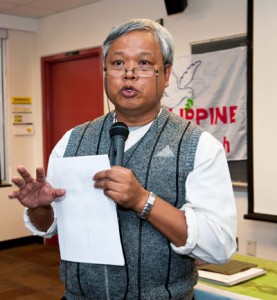
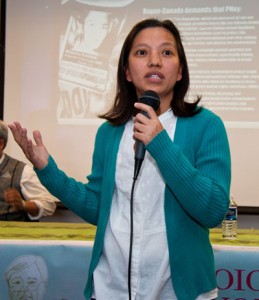
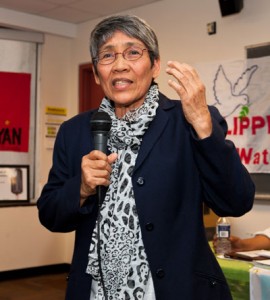
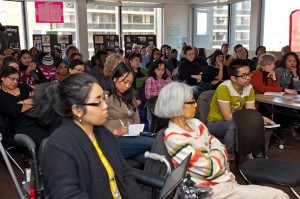
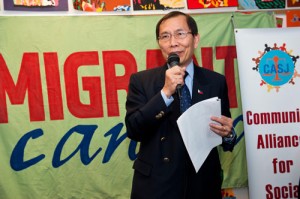
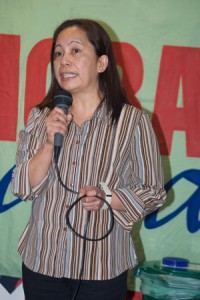
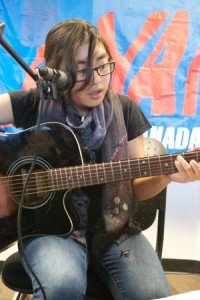
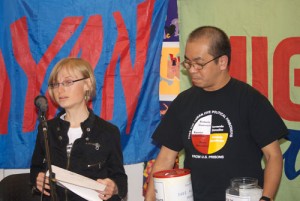
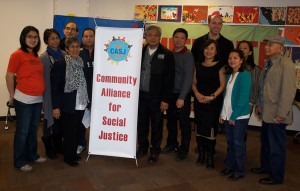
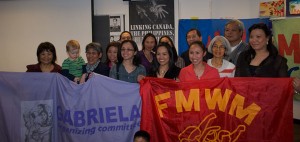
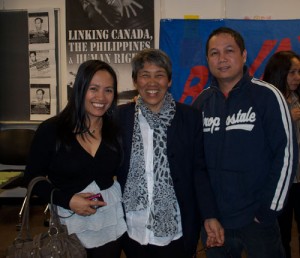
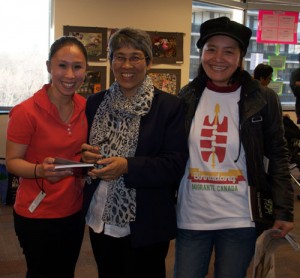
Comments (0)